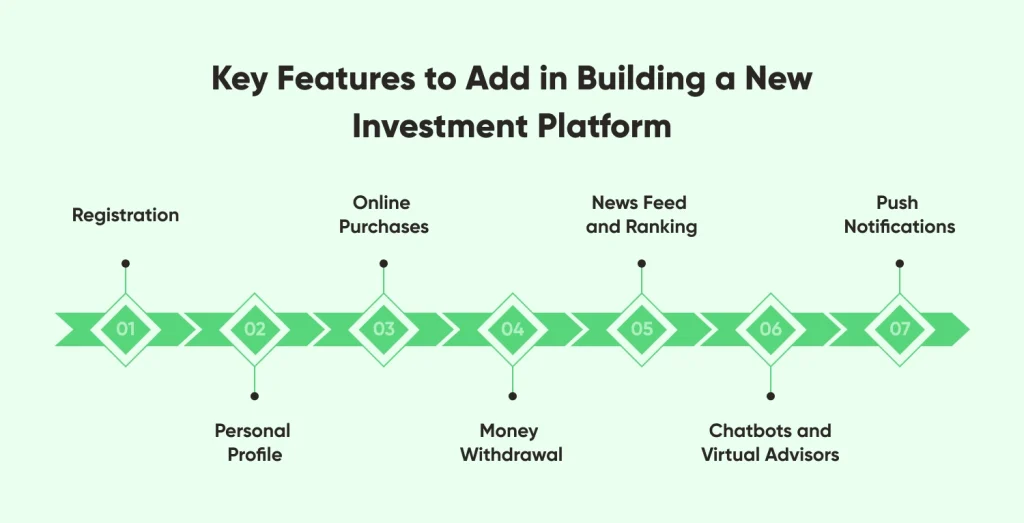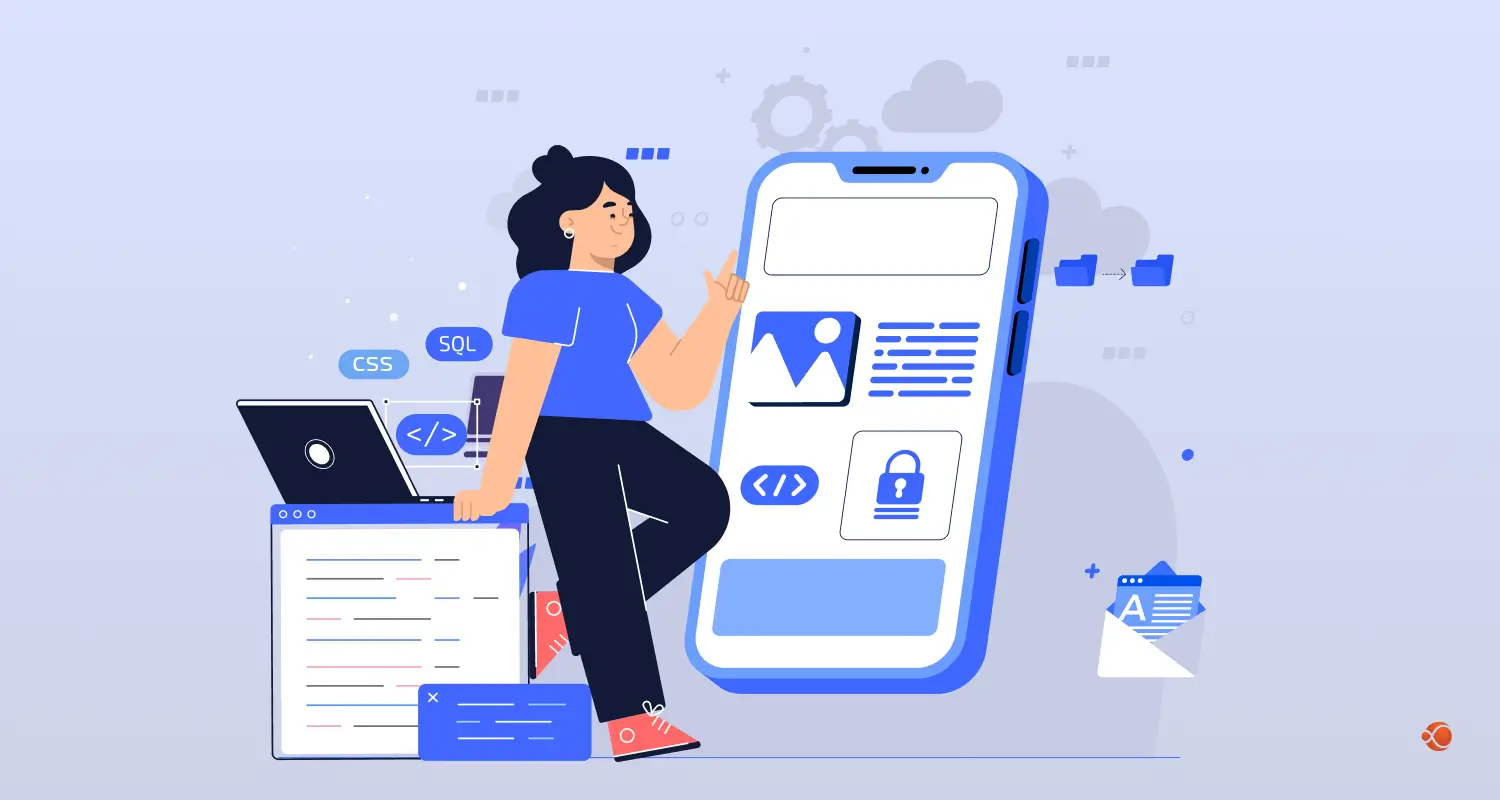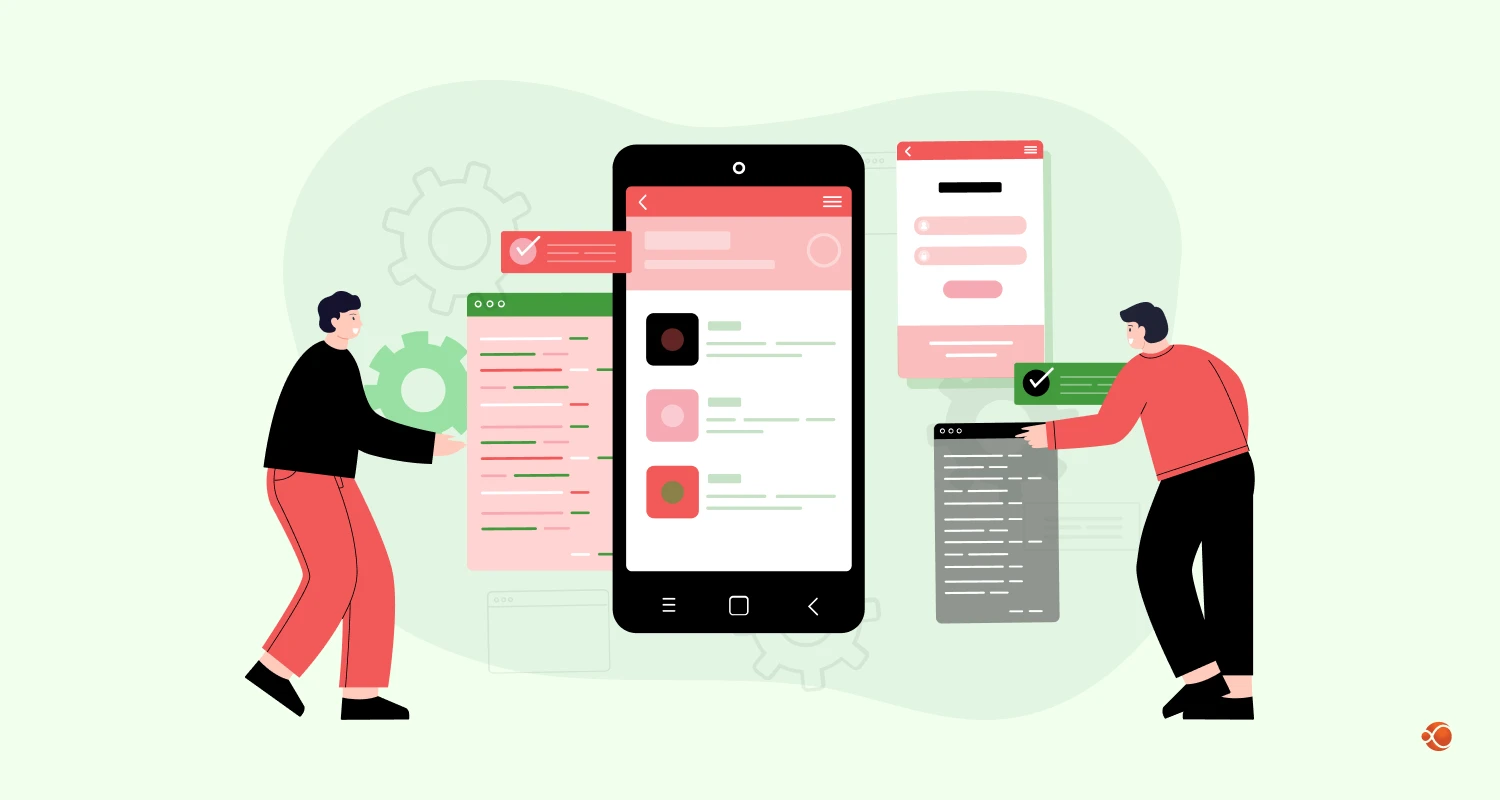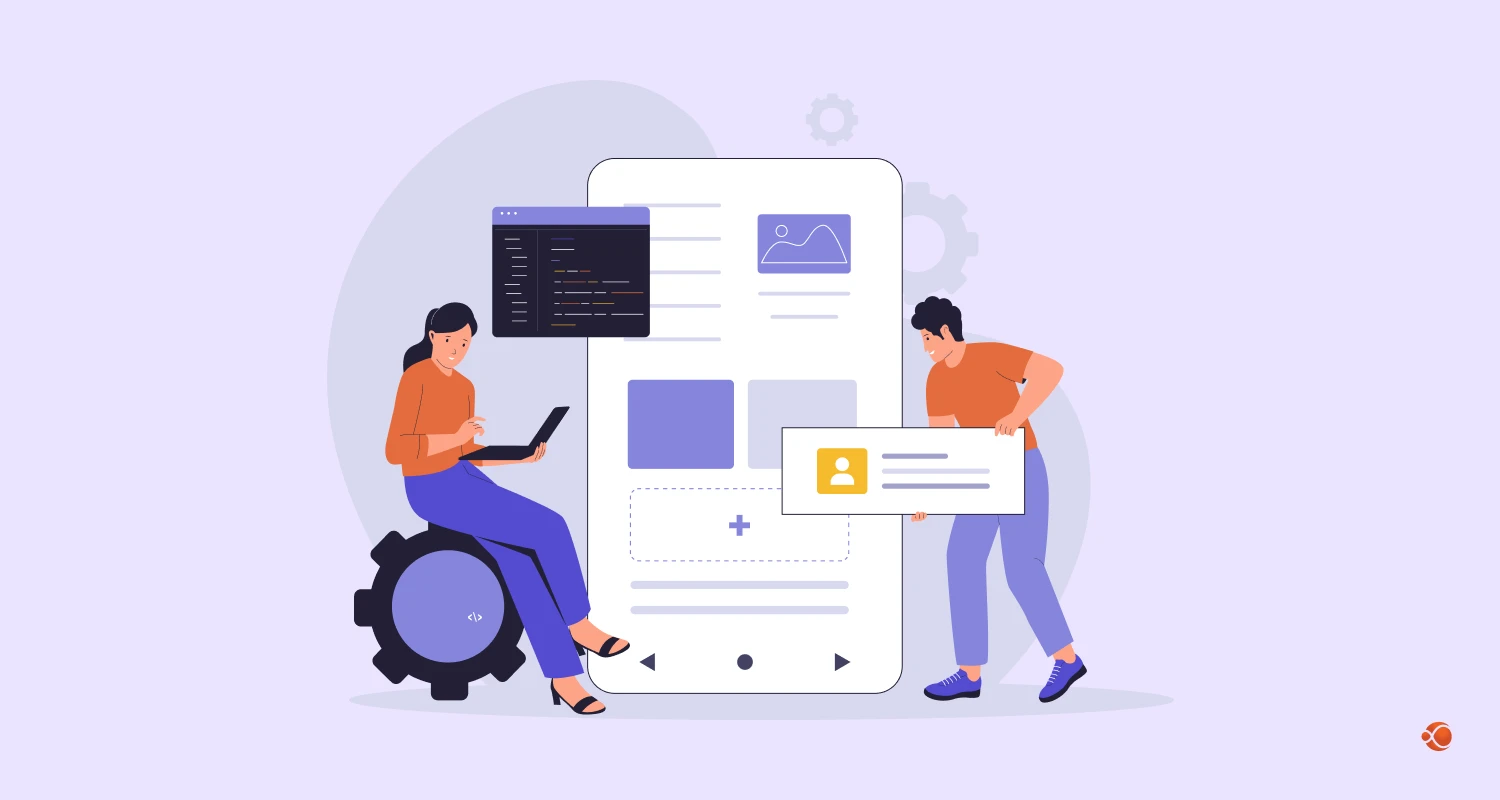In recent years, investment platforms have grown in strength and influence, revolutionizing how people handle their money. People can manage their financial holdings from anywhere at any time, which is why these apps are alluring.
According to Statista, the digital investment market is expanding quickly and is expected to reach a global value of US$5.27 trillion by 2027. Considering this prediction, it is obvious that this market will continue to be both extremely profitable and fiercely competitive. Therefore, you shouldn’t ignore creating an investment application if your goal is to obtain a competitive advantage in this market.
We’ll go over the crucial actions you should take to make sure your investment app achieves its maximum potential in today’s post. We’ll explore several types of apps and features to help you make your solution financially feasible and give you a better idea of what to think about while developing an investment online platform. Now let’s get going!
Different Examples of Investment Platforms in the Market
Robinhood
Founded in 2015 by businessman Vlad Tenev, Robinhood gained prominence in 2021 when its members, supported by Reddit forums, nearly brought down Wall Street with their group investment plan involving shares of GameStop.
The idea of fractional share investing, which enables traders to buy a portion of a share and enables even tiny investors to engage in the stock market, is another innovation that Robinhood is credited with popularising. To build a trading app like Robinhood, you need to consult a well-known development company that has expertise in creating digital investment platforms.
Capital
Established in 2016, Capital.com is a Cyprus-registered firm with a substantial presence in London, where its dual offices are located. Viktor Prokopenya is a technology entrepreneur. A trading platform for a variety of financial items, such as equities, commodities, currencies, and cryptocurrencies, is offered by Capital.com.
eToro
Through the social trading platform eToro, traders from all around the world can communicate and exchange information. Because users may follow and replicate the trades of other profitable traders, it’s a desirable choice for beginners who wish to pick up tips from more seasoned traders.
What are the Types of Investment Platforms?
Selecting an investment platform type that aligns with your business vision is a crucial first step when considering how to build one. For this reason, we’ve given you a rundown of the typical kinds of investment software.
Crowdfunding
All business concepts remain just that-concepts-until they have adequate finance. However, it can be difficult for entrepreneurs to attract investors; crowdfunding sites assist with this. Rather than asking for a sizable donation from a select few, crowdfunding involves asking for modest contributions from a wide number of people using specialized web platforms.
Developing a crowdfunding app entails setting up an online marketplace where producers/fundraisers and funders/backers can engage in crowdfunding activities. Software is used for virtual communication. To launch a campaign, you need to supply product photos, a business strategy, and a description of the initiative. Among the campaign types are nonprofits, commercial concepts, and individual requirements. When investors believe a project is worthy, they invest.
Peer-to-Peer Lending Platform
Platforms for peer-to-peer (P2P) lending facilitate the connection between loan-seeking individuals enterprises and investors online, doing away with the necessity for traditional financial institutions.
The creation of loan lending apps seeks to link investors and borrowers directly to democratize funding. They provide a different loan choice that can be easier to get and more effective. However, before participating in P2P lending operations, individuals must thoroughly understand the risks involved, undertake appropriate research, and evaluate their financial status.
Do it yourself
Unlike the preceding apps, Do-It-Yourself (DIY) apps necessitate personal decision-making as their name implies. They are better suited for experienced traders because they usually do not offer analytics or suggestions for investment ideas.
The main goal of do-it-yourself apps is to give investors access to crucial data, like stock prices and minimum amounts.
Exchange Platforms
Users are now able to investigate and participate in a variety of financial markets, such as those related to currency and cryptocurrencies, securities, commodities, and the like, thanks to the development of these outstanding financial investing apps.
Using mobile exchange platforms to trade and invest in different stocks while taking advantage of exchange rate variations is a simple process. If you are still confused and need more options, you can read our blog which gives in-depth insights on how to find investors for an app.
Key Features to Add in Building a New Investment Platform

Features of investment platforms can be broadly categorized as general and industry-specific.
The broad features are not fintech-specific; rather, they are the kinds of functionality you would expect across a wide range of applications. Among them are:
- Individual accounts to keep track of all user data and financial transactions
- Alerts in real-time so you never miss a crucial message
- Support for multiple platforms so that users can use the platform on any device
- Analytics dashboards to compare and view results to decide which investments to make
- Around-the-clock support to report problems right away and receive expert assistance, etc.
If you want to create a truly helpful investing platform, it’s crucial to concentrate on the features that come with it. These are the ones we recommend to add while creating investment platforms.
Registration
By onboarding a user, you can make them feel secure and at home. A new user’s onboarding process is an opportunity to introduce yourself and explain how your software functions. For investing apps, the onboarding phase is crucial because the registration process typically entails numerous requirements, such as KYC and AML processes.
These processes aid in user identification and guarantee that their earnings are legitimate. The weakest area of investing apps is this one, where a lot of customers unsubscribe. The fact is, that formalities irritate people. Even though you are powerless to stop the processes, you can at least help the user through them and make them feel at ease.
Personal Profile
Personal profiles function as investment portfolios in investing apps, allowing users to manage their assets and monitor their profitability.
With the usage of these insights, the app is better able to comprehend the user’s investing preferences and offer pertinent options and recommendations that are in line with their goals.
Online Purchases
Online transactions can be completed by integrating your investing platform with a payment provider.
Money Withdrawal
The personal profile should include access to private funds and the ability to withdraw money in addition to the transactions and portfolio.
News Feed and Ranking
Give your users access to a ranking of investing options to assist them in making wise financial judgments. The most popular stocks on the stock market are displayed in this top chart. A news feed that features the most recent corporate news might also be very beneficial to the user.
Chatbots and Virtual Advisors
One of the most popular trends in the market for investing apps is the financial counselor. For novice investors who are unsure about their investment abilities, this function can be a huge help.
Push Notifications
When developing an investment app, don’t overlook the push alerts in real-time. Users can receive notifications from the system about current account status, discounts, special offers, and changes in the stock price. Or notify the end of fraud prevention of any unexpected behavior on the account.

Step to Create an Online Investment Platform
The essential elements to building an effective investment platform are outlined below, along with best practices to reduce project risks and expedite platform launch payback.
Step 1: Business and Market Analysis
We begin the development process by carefully examining the following crucial elements:
- The client’s expectations regarding the platform’s capabilities and reach its availability in specific areas and its special demands regarding the user experience.
- Current market trends and the competitive landscape in several areas, including traditional and alternative investment, asset class-specific investment, B2B and B2C investment, and short- and long-term investment.
- The target audience, needs, and pains of the solution. The ability to increase the number of users on the platform.
- Practical methods for monetizing platforms.
The information gathered serves as the foundation for selecting the most appropriate niche, kind (web, mobile, or both), and monetizing one model. Introduce the list of features and functional requirements of the app.
Step 2: Search for an Investment Platform Development Partner
A significant degree of fintech software development expertise and substantial technical understanding are required to produce a product as complicated as the financial platform for investment services. Through the outsourcing of IT experts, entrepreneurs often find professionals to bring their financial app ideas to reality. They build a minimum viable product initially before the final app is launched to check the final testing and changes if needed.
There are several important elements to take into account when assessing a potential partner for software development outsourcing. Here are some important things to remember.
Assess the vendor’s experience and skill level in developing financial software that satisfies your requirements. Examine their case studies and actual client testimonials to ascertain their skills and level of industry knowledge.
A successful outsourcing partnership can be established by assessing the project management resources and communication strategies of the provider. It is essential to have access to dedicated project managers or team leaders who can facilitate effective communication and cooperation.
To your business, it’s also critical to take into account their location and time zone. To enable successful communication and collaboration, factors including proximity, language limitations, and overlapping working hours should be taken into consideration.
Step 3: Finalize the Design for Investment Platform
The development team advances from a vague platform concept to a well-defined solution design at this point. We provide:
- An ideal feature set for the platform, comprising features for security and compliance as well as value-adding capabilities made possible by highly skilled technicians (such as AI-powered suggestions for the best investments). We rank features according to how important they are to end users and whether they have the potential to pay off quickly.
- Platform architecture as well as the points of integration amongst its constituent parts. We design a scalable and robust system that can handle heavy traffic and easily handle the anticipated number of transactions.
- UX and UI design for different user roles (administrators, external partners, individual investors, and institutional investors, among others). Our goal when developing user experiences and the platform’s design is to maximize end users’ ease.
Step 4: Choose the Right Tech Stack
We assess the technologies and tools available for developing investment platforms and create the most appropriate toolkit while keeping the requirements of our clients in mind (such as quick solution launch and low operating costs).
Step 5: Development Phase
Typically, the creation of an investing platform utilizing includes:
- CI/CD, container orchestration, and other automated environments for development and delivery are established.
- Coding the APIs and back end of the platform.
- Designing user interfaces based on roles.
- Establishing a data storage system for investor and transactional data.
- Carrying out the necessary testing processes concurrently with development.
Step 6: QA and Testing
The creation of the investing platform can begin once all the technical details have been resolved. The goal of the UI/UX designers is to create an intuitive and user-friendly interface for your next software system. Developers take over the work once they’re done.
Encoding and implementing the previously selected functionality is the primary responsibility of software developers. When a system or a portion of its functionality is ready, Quality Assurance services should be rendered. The QA engineers ensure that there are no problems and the system is operating effectively. If they do, they file bug reports so the developers can address the issue.
Step 7: Deployment
The day of release indicates that the investing system is operational and prepared for you and your clients to use. The team posts your investment solution to marketplaces if it includes a mobile app, and the experts migrate your website to a live server if it is a website.
But, the vendor and you continue to work together after this. The specialists at the provider keep an eye on the functionality of your investment platform to promptly address any issues or incorporate new features that will improve the convenience of providing investment services via the developed software.
Conclusion
The lack of a minimum investment quantity makes investing applications popular, but to attract users’ attention and gain their trust, they must adhere to certain rules.
Thus, take into account its design, integrations, geography, user flow, and experience first whether you’re looking for SaaS application development services or are considering how to build an investing platform. Next, talk about the features you would like to see in the platform and whether or not they are simple to implement with the IT team. Lastly, confirm that the team is knowledgeable about the most recent industry standards for protecting user data in the investment app.
Developing an online investing platform is not a simple task; dealing with delicate subjects like money is never easy. For this reason, we advise you to reach out to the best software development partner to create fintech solutions.
Frequently Asked Questions
What Steps Should I Take When Establishing an Investment Platform?
Follow the below steps to create a successful investment platform for your business.
Analysis of the business, market, and end user.
Design of an investment platform.
Choice of tech stack.
Organizing a project.
Creation of an investment platform.
Release and deployment of the platform.
Support and evolution following the launch.
How to Get Funding for an App?
Get your investment for a tech Startup right with the help of the following ways.
Since the mobile industry is growing, there are many options for raising money for an app:
Entrepreneurship.
Individual network.
Individual investors.
Contests for app financing.
Angel brokers.
Investors in venture capital (VC).
The crowdfunding model.
Bank advances.
How Do Different Investor Needs Shape Investment Platform Types?
Investment platforms are designed to address various investor needs through different software types. Crowdfunding platforms facilitate small-scale funding, P2P lending platforms connect investors and borrowers directly, DIY apps cater to experienced traders with data access, and exchange platforms offer engagement in diverse financial markets. These platforms incorporate features such as real-time alerts, cross-platform support, and analytics to meet the specific requirements of different investor groups.







